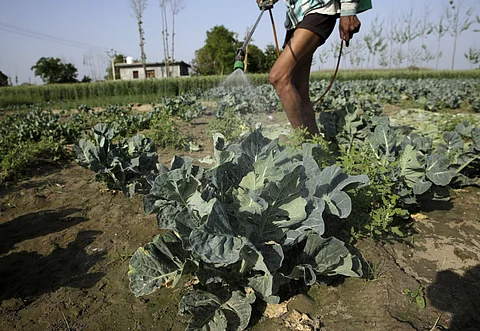

As global delegates prepare to gather in Geneva, Switzerland for a major chemical safety summit, Indian experts have called for an immediate ban on chlorpyrifos, a toxic pesticide still widely used in the country despite bans in over 40 nations.
World’s leading policymakers and scientists will convene in Geneva from April 28-May 9, for the 2025 Conferences of the Parties to the Basel, Rotterdam and Stockholm Conventions (BRS COP). These summits are multilateral environmental agreements, which share the common objective of protecting human health and the environment from hazardous chemicals and wastes.
Chlorpyrifos, a pesticide classified as ‘moderately hazardous’ by the World Health Organization, continues to be used in India on a variety of crops, posing a serious threat to farmers, consumers, future generations and ecosystems.
The upcoming COPs included the 17th meeting of the Conference of the Parties to the Basel Convention (BC COP-17), the 12th meeting of the Conference of the Parties to the Rotterdam Convention (RC COP-12) and the 12th meeting of the Conference of the Parties to the Stockholm Convention (SC COP-12), all scheduled to take place back-to-back in Geneva.
Speaking ahead of the negotiations, AD Dileep Kumar, chief executive officer of the coalition Pesticide Action Network (PAN) India, said the stakes were high for public health and the environment and the time for decisive action is now.
“The world must no longer turn a blind eye to the scientific consensus on chlorpyrifos. Its link to neurotoxicity, irreversible brain damage in unborn children, reproductive toxicity and its ability to travel thousands of miles, contaminating even the most remote ecosystems, make a strong case for its global elimination,” Kumar stated.
PAN India plans to advocate for the inclusion of chlorpyrifos under Annex III of the Rotterdam Convention, which mandates prior informed consent before international trade of hazardous chemicals. The organisation also urged parties to the Stockholm Convention to list chlorpyrifos under Annex A — a designation that calls for a global ban.
While exemptions are typically allowed under this provision, PAN India pushed for a total ban, citing the availability of safer alternatives. Even though chlorpyrifos is approved for use on 18 crops in the country, a 2022 report had found unapproved and unauthorised use of dangerous agrochemicals like chlorpyrifos and paraquat across India.
The Stockholm Convention, adopted in 2001, aims to eliminate or restrict persistent organic pollutants — chemicals that remain in the environment, bioaccumulate in wildlife and humans and cause long-term ecological and health damage.
In addition to chlorpyrifos, delegates at the BRS COPs were expected to consider adding other pesticides, such as paraquat, acetochlor, carbosulfan, iprodione, methyl bromide and fenthion, to Annex III of the Rotterdam Convention. This step would strengthen transparency and accountability in the global trade of pesticides.
“BRS Conventions have been quietly working, through an established decision-making backed by science and consultation. I believe these Conventions require more resources to scale up on the reviews of chemicals, define targets and establish a global monitoring framework that informs on a real time basis. National governments, including India, have to mimic these processes, at the national level, to strengthen international work,” said Dr Narasimha Reddy Donthi , a public policy analyst based in India.
Recent data from the Consolidated List of Banned Pesticides and the Highly Hazardous Pesticides List expose the urgent need for India to align with international best practices — 568 pesticide active ingredients have been banned by one or more countries, many of which remained in use in India. This underscores the need for the country to align with international best practices.
With this year’s negotiations seen as a potential turning point in global governance to reduce chemical harm, especially for communities in the Global South. Experts have urged Indian policymakers, parties to the BRS Conventions and industry stakeholders to phase out chlorpyrifos and other hazardous pesticides in favour of safer, sustainable alternatives.
“India can and must choose a different path — one that values human life over chemical dependency,” said C Jayakumar, executive director of indigenous humanitarian organisation Thanal and a veteran campaigner for elimination of dangerous pesticides at the BRS conventions.
Jago Wadley, International Advocacy Manager at PAN UK, added that countries must stop blocking the listing of hazardous chemicals like chlorpyrifos and paraquat for political or commercial reasons and start following the science and convention procedures.